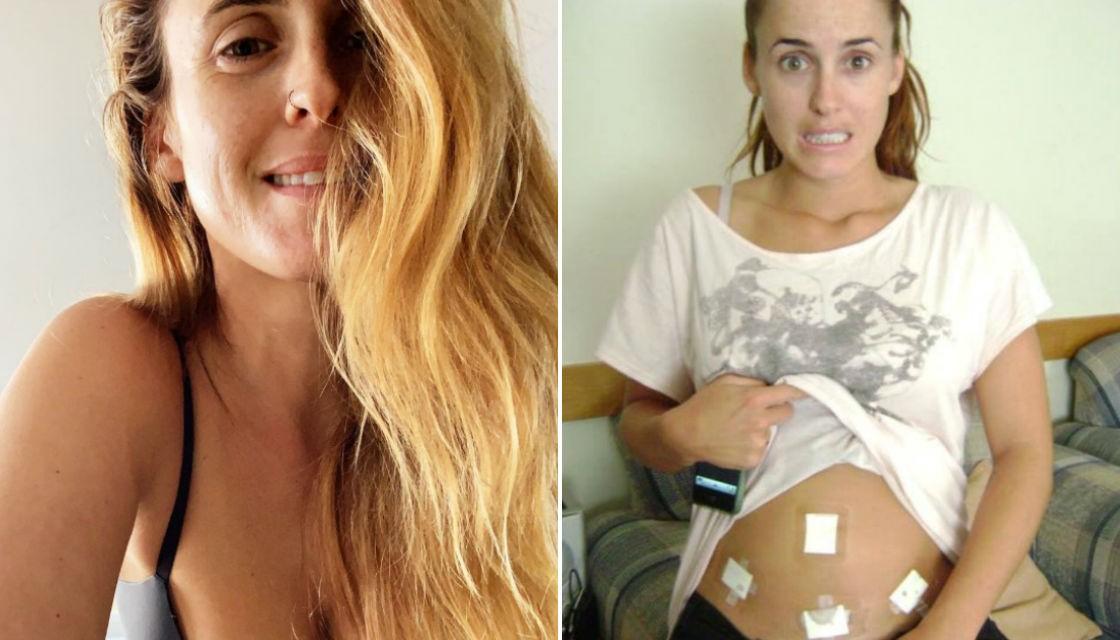
A woman with endometriosis has spoken out about her battle to be diagnosed with the life-altering medical condition.
Alyssa Stringfellow's symptoms were overlooked, dismissed and incorrectly diagnosed as mental health issues during her 11-year fight to figure out what was wrong.
It's an all too common experience for many women turned away by medical professionals trying to find answers for excruciating and frustrating complications.
Many are told their suffering is just "a normal part" of being a woman and having periods, Endometriosis NZ president Debroah Bush told Newshub.
The inflammatory pelvic disease, where tissue similar to the lining of the uterus is found in places outside the uterus, affects one in 10 Kiwi girls and women during their reproductive years.
After getting her period age of 10, Stringfellow, 33, was diagnosed with endometriosis at the age of 21.
But before her stage four endometriosis was confirmed, Stringfellow fought a battle getting those around her to believe she had the invisible illness.
She was going into hospital once every couple of months with severe pain where she was labelled "melodramatic" before being sent home.
In New Zealand, endometriosis takes an average of around eight years to diagnose because not all GP’s are able to spot or correctly identify it, Bush says.
For this reason, a global campaign is being held in March to raise awareness about the disease, which affects 176 million women worldwide.
Stringfellow says doctors thought she was inventing the symptoms and had psychological issues.
She was misdiagnosed with bipolar disorder, manic depression and borderline personality disorder while studying at high school.
"I got put on all of these different drugs and nobody would listen to me," Stringfellow told Newshub.
"It made me suicidal, it made me so introverted because even at school, people were making fun of me and bullying me because I was off sick all the time or not feeling great. It was horrific."
When she was 18, Stringfellow went to a gynaecologist who identified via an exploratory laparoscopy that she had scar tissue through her abdomen but wasn't sure where it was from.
"The pain is surprising, the first one is a shock," Stringfellow said.
At the age of 20, a friend working as a nurse recommended a specialist two-and-a-half hours outside of Sydney where she was living.
The doctor referred her to Dr Jason Abbott who completed his PhD on the surgical treatment of endometriosis.
After a second laparoscopy at 21 as well as an endometrial ablation, Stringfellow was diagnosed with stage four endometriosis.
"I literally bawled my eyes out at his office when they confirmed to me that I had endo, and told me that I wasn't crazy," she says.
Despite her frustrated complaints finally acknowledged as warranted, it didn't stop the complex traits of the disease.
Stringfellow still experiences extreme pain, chronic nausea, headaches, fatigue and unable to walk.
"Suddenly, out of nowhere, it will be like someone is fisting your cervix. Sometimes it feels like hot pokers, sometimes it feels like cold pokers," she says.
"When you move your legs forward, it feels like you've got pain running from your stomach down to your toes, it feels like you're tearing in half."
The severity of these symptoms is regularly brushed off.
She felt bullied at a former workplace when women questioned her ability to withstand regular period pain.
She says they later came around and apologised because people closer to them had endometriosis too.
"Because it's a women's health issue it gets brushed under the rug because no one wants to talk about the fact that we're shedding our lining and bleeding, and it gets our tolerance of pain is doubted."
With no cure available, the disease is made even more frustrating by a lack of ways to manage it.
"You pay hundreds and hundreds of dollars to see these specialists and they just tell you to go on the pill, or offer surgery, but none of it works as a long term cure."
Stringfellow recommends visiting an endocrinologist or an endometriosis specialist ahead of a gynaecologist if a woman is experiencing symptoms.
"That's a mistake so many women make," she says.
Getting and idea of the regularity of symptoms is key, according the Stringfellow, who uses her social media as a platform to openly share her experiences, give advice and raise awareness.
Stringfellow says keeping track of how different foods effect the body can be useful and making dietary changes in the days leading up to a period.
Deborah Bush, who is a World Endometriosis Society (WES) Board trustee and was awarded the New Zealand Order of Merit (MNZM) for her work in women's health, told Newshub for years women have been suffering stoically, often given inadequate and inappropriate treatment.
Research shows that 27 percent of girls are missing school regularly due to their crippling endometriosis pain, interfering with their education and their futures.
Many go on as adult women to experience difficulty gaining and holding down employment, struggling with mental health issues and infertility, chronic stabbing stomach pains, IBS symptoms
"Some have been suicidal such has been their despair, frustration and inability to cope with the excruciating pain and ongoing sense of helplessness."
On Monday, guidelines for GPs, surgeons and all health professionals to follow to help the diagnosis and treatment of women with endometriosis in New Zealand were launched in Parliament.
"We have spent decades supporting thousands of desperate patients, some as young as 11 or 12, with many waiting years, even decades for a formal diagnosis," she says.
Bush said the move hopefully "heralds a brighter future" for the Kiwi women and girls battling the disease not monthly, but on a daily basis.
The battle to establish formal clinical guidelines has been a personal crusade for New Zealand’s global endometriosis campaigner.
"We just have to do better for the 130,000 New Zealand patients living with endometriosis."




